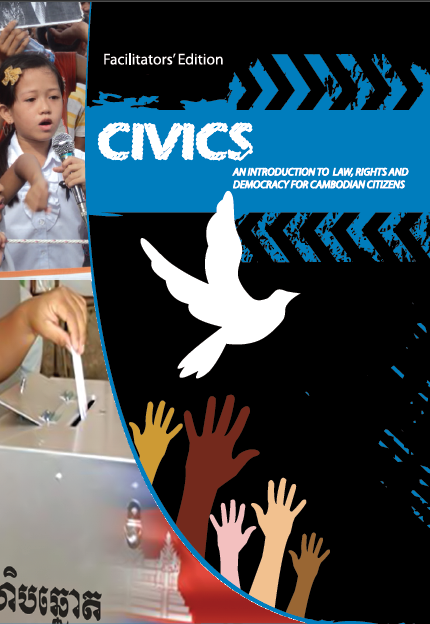
Civics: An Introduction to Law, Rights and Democracy for Cambodian Citizens
Publication Year: 2011 / Sources: Bridges Across Borders CambodiaCivics is the study of the rights and duties of citizenship. Citizens play a critical role in democratic societies, which rely on their participation to function and flourish. Being informed about civics is especially important in societies like Cambodia, which are still making the transition to a fully developed democracy.
Download: English | Khmer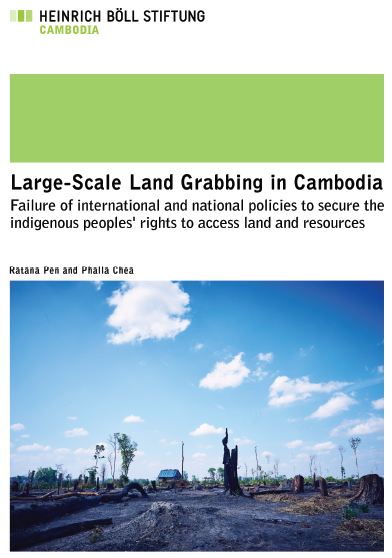
Large-Scale Land Grabbing in Cambodia: Failure of International and National Policies to Secure the Indigenous Peoples’ Rights to Access Land and Resources
Publication Year: 2015 / Sources: Heinrich Böll FoundationSince the 1990s, the Cambodian state has attempted to encourage economic development in rural areas through a system of “Economic Land Concessions” (ELCs) in the agroindustry, the mining sector and tourism– both foreign and domestic – over hundreds of thousands of hectares in the country. This development pattern has been especially critical in indigenous upland regions, including the northeast, where less intensive land-use patterns prevail and natural resources are commonly seen as underutilized.
Download: English | Khmer
Alternate Dispute Resolution Tool
Publication Year: 2013 / Sources: Cambodian Human Rights and Development Association (ADHOC)We have different mechanisms, such as negotiation, mediation or conciliation, to solve the disputes or conflicts outside the court system. This fits with the culture of Cambodian people countrywide, both in rural and urban areas, since they have used these mechanisms for centuries. However, they do not have any formalized tools or documents for solving conflicts in the future. Currently we find very few documents related to Alternative Dispute Resolution
(ADR).

Policy for the Poor? Phnom Penh, Tenure Security & Circular 03
Publication Year: 2013 / Sources: The Urban InitiativePhnom Penh’s urban poor are under threat. Over the past two decades, 11% of the city’s current population has been displaced, often forcibly evicted, to poorer futures. A key government argument – when such arguments have been provided – has been that many of those affected have been illegal squatters, living on state public land. Habitually, however, there is no assessment of whether or not the occupants have rights to the land as legal possessors.
Download: English | Khmer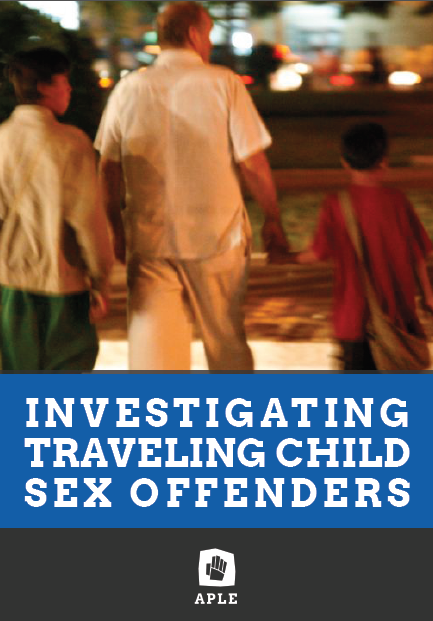
Investigating Travelling Child Sex Offenders
Publication Year: 2014 / Sources: Action Pour Les Enfants (APLE) CambodiaIn the period 2003-2013, APLE investigations resulted in 288 arrests. Detailed information has been collected about the offenders, victims, and the legal process in each case. All data has been analysed and APLE staff members were consulted to provide their expertise about the topics in question. The objective is to provide substantial knowledge about traveling child sex offenders, victims of child sexual abuse and exploitation, and the legal process in Cambodia.
Download: English | Khmer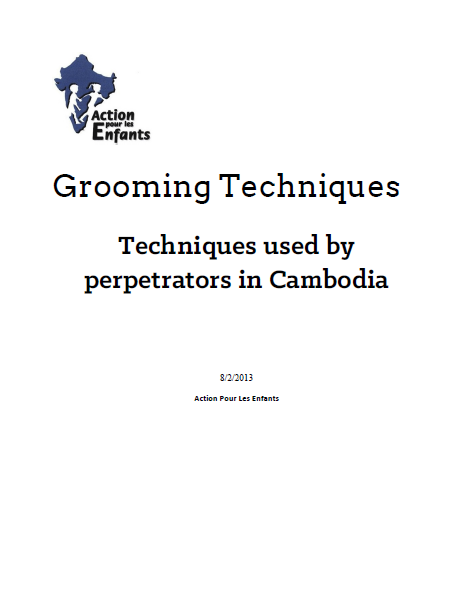
Grooming Techniques: Techniques Used by Perpetrators in Cambodia
Publication Year: 2013 / Sources: Action Pour Les Enfants (APLE) CambodiaA technique often used in street-‐‑based exploitation is grooming. “Grooming”, in this publication, is a term that describes the techniques and behaviors that child sex offenders use to develop a relationship of trust, control and dependence with their victims (and often the victims’ʹ families and communities). Common techniques for travelling child sex offenders are to provide their victims, the victim’s family or the victim’s community with monetary support, food and shelter, gifts, holidays and education.
Download: English | Khmer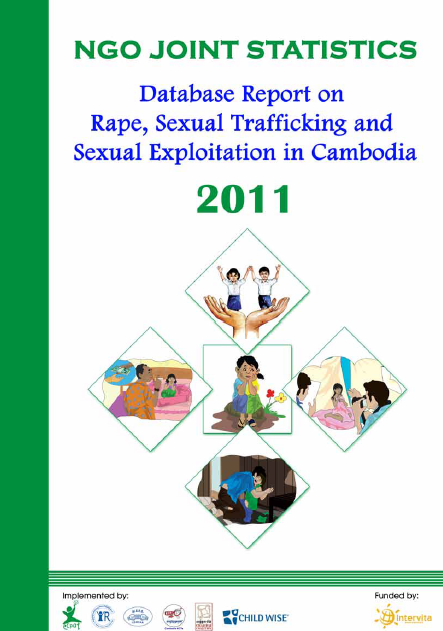
Database Report on Rape, Sexual Trafficking and Sexual Exploitation in Cambodia
Publication Year: 2011 / Sources: ECPAT CambodiaThis report aims to provide stakeholders and the public with a general insight into the dynamics and trends of Sexual Trafficking, Sexual Exploitation and Rape in Cambodia, and to provide relevant stakeholders (for example, international organizations, NGOs, government agencies) useful information to keep up-to-date with dynamics and trends, as well as inform the identification of intervention priorities and strategies. On the other hand, the Reports aim to improve the general public’s access to (basic) information on three serious issues affecting Cambodian society.
Download: English | Khmer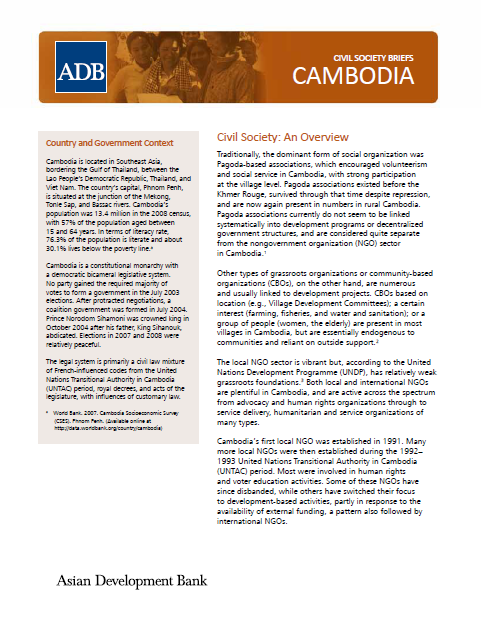
Civil Society Briefs: Cambodia
Publication Year: 2011 / Sources: Asian Development Bank (ADB)International and local NGOs play a major role in providing or supporting basic social services, often in remote areas and communities, and are present in every province and major sector in Cambodia. NGOs also bring alternative models and approaches to development—emphasizing participation, equity, gender sensitivity, and environmental sustainability.
Download: English | Khmer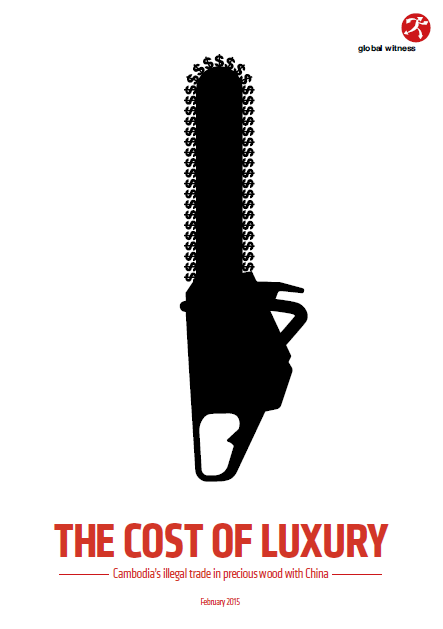
The Cost of Luxury: Cambodia’s illegal trade in precious wood with China
Publication Year: 2015 / Sources: Global WitnessCambodia is reported to have the fifth highest deforestation rate in the world. In 1970, forests covered approximately 70 percent of the country’s territory but by 2013 total tree cover (including plantations) was estimated at only 43 percent.
Download: English | Khmer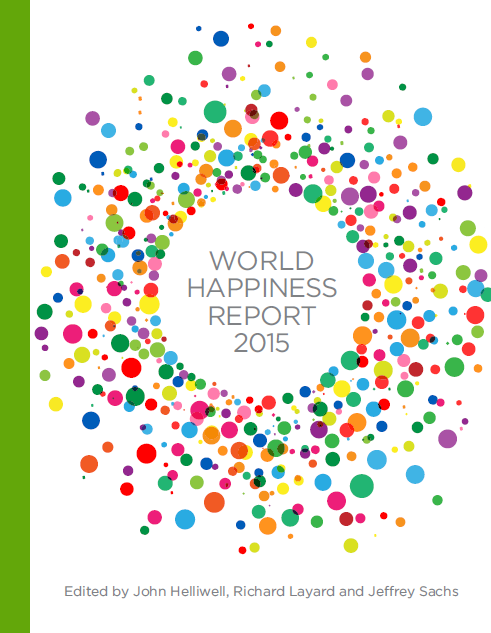
World Happiness Report 2015
Publication Year: 2015 / Sources: A Group of Independent ExpertsThe world has come a long way since the first World Happiness Report in 2012. Happiness is increasingly considered a proper measure of social progress and a goal of public policy. So it is worth beginning with some history, before summarizing the present report.
Download: English | Khmer